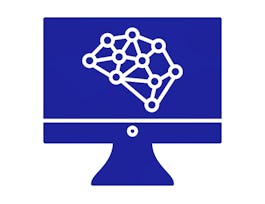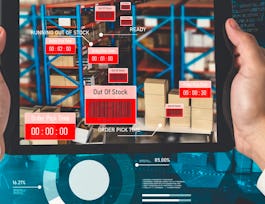This course will teach you how to leverage the power of Python to understand complicated supply chain datasets. Even if you are not familiar with supply chain fundamentals, the rich data sets that we will use as a canvas will help orient you with several Pythonic tools and best practices for exploratory data analysis (EDA). As such, though all datasets are geared towards supply chain minded professionals, the lessons are easily generalizable to other use cases.

Offrez à votre carrière le cadeau de Coursera Plus avec $160 de réduction, facturé annuellement. Économisez aujourd’hui.


Fundamentals of Machine Learning for Supply Chain
Ce cours fait partie de Spécialisation Machine Learning for Supply Chains


Instructeurs : Rajvir Dua
3 558 déjà inscrits
Inclus avec 
(34 avis)
Expérience recommandée
Ce que vous apprendrez
Learn to merge, clean, and manipulate data using Python libraries such as Numpy and Pandas
Gain familiarity with the basic and advaned Python functonalities such as importing and using modules, list compreohensions, and lambda functions.
Solve a supply chain cost optimization problem using Linear Programming with Pulp
Compétences que vous acquerrez
- Catégorie : Data Science
- Catégorie : Numpy
- Catégorie : Pandas
- Catégorie : Linear Programming (LP)
- Catégorie : Supply Chain
Détails à connaître

Ajouter à votre profil LinkedIn
8 devoirs
Découvrez comment les employés des entreprises prestigieuses maîtrisent des compétences recherchées

Élaborez votre expertise du sujet
- Apprenez de nouveaux concepts auprès d'experts du secteur
- Acquérez une compréhension de base d'un sujet ou d'un outil
- Développez des compétences professionnelles avec des projets pratiques
- Obtenez un certificat professionnel partageable


Obtenez un certificat professionnel
Ajoutez cette qualification à votre profil LinkedIn ou à votre CV
Partagez-le sur les réseaux sociaux et dans votre évaluation de performance

Il y a 4 modules dans ce cours
Welcome to the course! In this first module, we’ll learn about the fundamentals of programming and Python. We’ll start with basic data structures, functions, and loops and then some time becoming familiar with importing modules and libraries. Finally, we'll put our new skills to the test by optimizing a supply constraint problem using linear programming techniques.
Inclus
12 vidéos5 lectures3 devoirs4 devoirs de programmation1 sujet de discussion5 laboratoires non notés
In this next module, we'll dive into the most common tools used for data science: Python, and Numpy. We'll start with Numpy, getting used to np arrays and their main functionality. After getting familiar with loading in data of all types, we'll learn about some basic data description and cleaning techniques. We'll also learn to work with indexes and columns in Dataframes. We'll end with an introduction to plotting and summary statistics. We will use common supply chain data sets for our explorations
Inclus
9 vidéos3 lectures3 devoirs1 devoir de programmation1 sujet de discussion2 laboratoires non notés
In this third module, we'll take our Pandas and Numpy skills to the next level, learning how to effectively combine and reshape data. We'll learn how to reshape data to fit with our needs through merges and pivots. This setup will help us tackle common data preprocessing steps necessary to run machine learning algorithms, such as one-hot encoding. Finally, we'll encounter the most important tools in our Pandas arsenal (Groupby-Apply-Transform) and explore its transformative functionality.
Inclus
5 vidéos3 lectures1 devoir1 devoir de programmation1 sujet de discussion2 laboratoires non notés
In this final project, we'll take collection of various data sets involving warehouse capacities, product demand, and freight rates to optimize cost of producing and shipping products.
Inclus
2 vidéos1 devoir1 devoir de programmation1 laboratoire non noté
Instructeurs

Offert par
Recommandé si vous êtes intéressé(e) par Data Analysis

LearnQuest

Coursera Project Network

Fractal Analytics
Pour quelles raisons les étudiants sur Coursera nous choisissent-ils pour leur carrière ?




Avis des étudiants
Affichage de 3 sur 34
34 avis
- 5 stars
44,11 %
- 4 stars
26,47 %
- 3 stars
11,76 %
- 2 stars
8,82 %
- 1 star
8,82 %

Ouvrez de nouvelles portes avec Coursera Plus
Accès illimité à plus de 7 000 cours de renommée internationale, à des projets pratiques et à des programmes de certificats reconnus sur le marché du travail, tous inclus dans votre abonnement
Faites progresser votre carrière avec un diplôme en ligne
Obtenez un diplôme auprès d’universités de renommée mondiale - 100 % en ligne
Rejoignez plus de 3 400 entreprises mondiales qui ont choisi Coursera pour les affaires
Améliorez les compétences de vos employés pour exceller dans l’économie numérique
Foire Aux Questions
Access to lectures and assignments depends on your type of enrollment. If you take a course in audit mode, you will be able to see most course materials for free. To access graded assignments and to earn a Certificate, you will need to purchase the Certificate experience, during or after your audit. If you don't see the audit option:
The course may not offer an audit option. You can try a Free Trial instead, or apply for Financial Aid.
The course may offer 'Full Course, No Certificate' instead. This option lets you see all course materials, submit required assessments, and get a final grade. This also means that you will not be able to purchase a Certificate experience.
When you enroll in the course, you get access to all of the courses in the Specialization, and you earn a certificate when you complete the work. Your electronic Certificate will be added to your Accomplishments page - from there, you can print your Certificate or add it to your LinkedIn profile. If you only want to read and view the course content, you can audit the course for free.
If you subscribed, you get a 7-day free trial during which you can cancel at no penalty. After that, we don’t give refunds, but you can cancel your subscription at any time. See our full refund policy.


